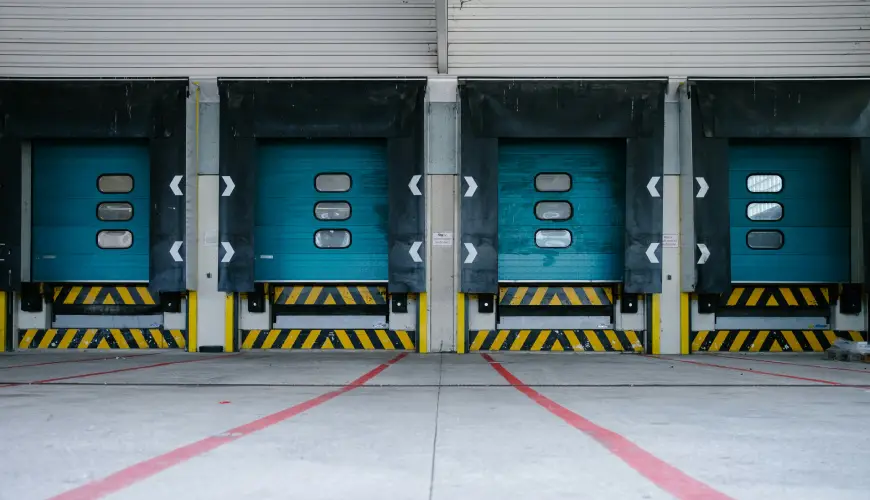
Industrial Warehouse Dock Doors – A Threshold between Extremes
In most supply chain facilities, dock and door systems are expected to operate around the clock keeping harsh weather out, hospitable environments in, and operators and goods safe. For this reason, dock system maintenance is a crucial necessity of any supply chain operation — not just dock and door maintenance, but for the entire dock system as a whole.
When dock systems are properly maintained, warehouse managers benefit in many ways, including:
- Operational Efficiency — well-maintained dock systems promote the highest levels of dock traffic, performance, and throughput, minimizing downtime and maximizing productivity.
- Safety — docks are inherently dangerous locations within a warehouse, given their high levels of traffic, noise, and congestion. Properly maintaining dock components is the only way to ensure that safety provisions will be fully functional when they’re needed most.
- Cost Avoidance — investing in dock component maintenance may introduce a marginal ongoing operating cost, but this cost is almost always less than the cost of reactively addressing unexpected or emergency breakdowns.
- Product Protection — poorly maintained dock doors, levelers, seals, and shelters result in outside weather, debris, and pests making their way inside. This debris often deposits onto product packaging, leading to issues ranging from additional cleaning labor to significant product contamination. Keeping dock components in good repair helps protect products from debris and promotes high customer satisfaction.
- Energy Efficiency — warehouses can waste a great deal of energy by leaking conditioned air out through poorly maintained dock doors. When dock systems and seals are properly maintained, this directly improves a dock’s energy efficiency.
Additional Dock Performance Tips and Considerations
Once warehouse managers deploy a routine dock system maintenance program, they are well on their way to ensuring high dock performance and cost savings over the long run. Beyond this routine maintenance plan, there are several additional considerations that managers can keep in mind towards further optimizing their dock’s operations.
- Operator Training — every staff member that works in or around a warehouse dock shares responsibility for the function, safety, and efficiency of that space. Maintenance technicians should be thoroughly trained on each service task described in the above checklist, but even more importantly, forklift operators and general dock staff should all be trained on how to identify, communicate, and react to adverse dock conditions the moment that they’re discovered.
- Mechanical Rebuilds — while our above routine maintenance checklist generally stops at annual testing, there are additional service requirements for most dock systems that are up to warehouse managers to prescribe. Most notably, dock doors, levelers, and trailer restraints benefit greatly from complete mechanical teardowns and rebuilds, which depending on the application may be needed every two to ten years. These rebuilds completely replace wear parts, inspect every component, and stress test all critical parts so that aging systems are returned to near-original levels of safety and reliability.
- Labeling and Signage — most dock components come with their own safety labeling, but these are often so small and obscure that dock employees don’t take notice. Warehouse managers are encouraged to install and maintain their own safety signage to make absolutely sure that all employees see the warnings.
- Trailer Integrity Inspections — some warehouses go through extensive efforts to maintain their dock systems but then disregard inspecting trailer floors for structural issues that can lead to forklift accidents. In many ways, trailer floors are an extension of a dock and as such, managers are encouraged to add trailer floor inspections to their dock system inspection plans.
- Contract Dock System Service — many material handling businesses prefer to contract out dock maintenance services to a third-party service provider instead of directly hiring technicians for this work. In such cases, service providers can wrap up comprehensive dock maintenance tasks into a single cost-effective package, and can even incorporate wider services to support a customer’s entire equipment fleet.
We hope that this discussion on material handling techniques and technologies proves useful to your manufacturing, construction, and distribution interests. Atlantic Forklift Services is your premiere material handling equipment resource, serving customers in the North and South Carolinas with professional equipment sales, rentals, service, repair, parts, training, and solution consulting. As a Platinum award-winning dealership, Atlantic partners with world-class equipment manufacturers including Doosan (now Bobcat), Hyster, Toyota, and Yale. To learn more, please contact us by phone at (866) 243-0991info@atlanticforkliftservices.com, or on the web at https://www.atlanticforkliftservices.com/.
